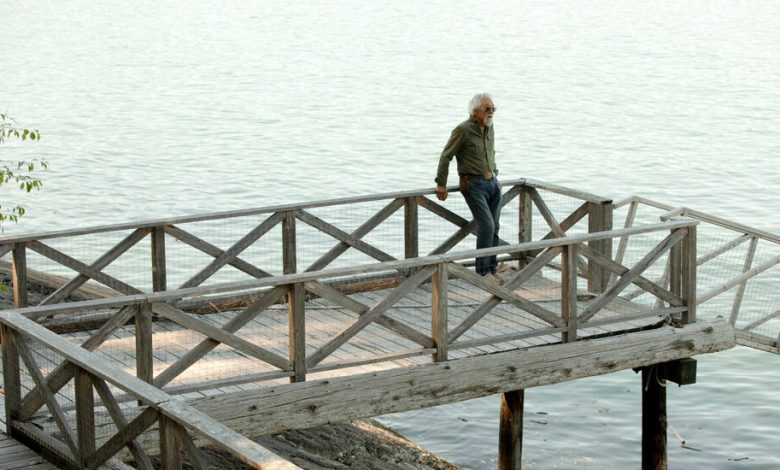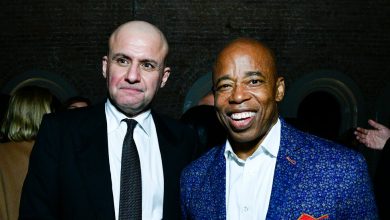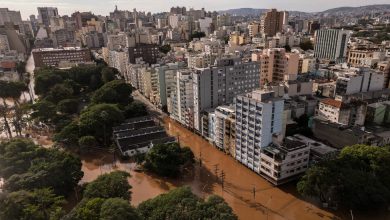He Warned Canada About Climate Change but Says, ‘We’ve Failed Big Time’

Lifelike prints of fish caught by his young grandchildren adorned the walls of David Suzuki’s vacation home — finely detailed images of rock cods and salmon created by pressing the animals into white paper layered with black ink, following the traditional Japanese art form of gyotaku, or fish rubbing.
However artful, the motive behind these biologically accurate images was not aesthetic but pedagogical, said Dr. Suzuki, the geneticist, science broadcaster, prolific author and perhaps Canada’s most prominent environmentalist.
The fish had gotten smaller over the years in the waters around Quadra Island off Canada’s west coast, where Dr. Suzuki has had a cottage for 35 years. And human mismanagement of nature, he couldn’t help believing, would shrink them further.
“My grandchildren will be able over time to see how change is occurring,” Dr. Suzuki said. And with that knowledge inspiring them, “they’ll do everything they can to fight for this kind of place.”
Dr. Suzuki spent much of this past summer on Quadra Island, which is surrounded by the Salish Sea, one of the most biologically diverse bodies of water in the world. The island has long been his “touchstone” and “the salvation of my sanity,” Dr. Suzuki said. But he was deeply pessimistic about the future health of his cherished escape.
For decades, Dr. Suzuki was the most recognizable face in Canada warning about the dangers of human-induced climate change, as he twisted arms in governments and companies through a namesake foundation. His efforts were aided by his familiar and trusted face: As the host since 1979 of CBC’s “The Nature of Things,” he helped popularized science in general, and environmentalism in particular, on a show that has aired in more than 80 countries.
But after retiring from the show in April, Dr. Suzuki watched as record wildfires burned and heat records were set across Canada over a summer that raised worries about climate change more than ever.
“We’ve failed big time,” Dr. Suzuki said of the environmental movement. “We as environmentalists focused on issues: drilling in the Arctic National Wildlife Refuge, threats to the caribou herd, stopping a dam in the Amazon. But even when we won, we failed as a movement to change the underlying assumptions of society, the behavior of government and business people.”
Dr. Suzuki has talked about environmentalism’s failure in the past, but his words perhaps rang with more finality this time. Not only were they pronounced during a summer of catastrophes for Canada’s environment, they came as Dr. Suzuki has slipped — at age 87 — into what he described as the “death zone,” a time, in his view, for assessing one’s life.
“The death zone, it’s not being morbid; it’s just reality,” Dr. Suzuki said. “I feel privileged to have lived as long as I have, and that makes it all the more important to start saying: ‘What did I learn in my lifetime? What should I be passing on to my grandchildren?’”
Dr. Suzuki spoke during an interview on Quadra Island, where his modest vacation home overlooks a bay and is reached by a dirt road. Three grandchildren — offspring of Sarika Cullis-Suzuki, a daughter from his second marriage and a marine biologist — were busy scooping up crabs, clams and sand dollars at the same tidal pool where their mother had done research for her Ph.D. Lunch would consist of sweet shrimp, salmon sashimi, clams and oysters, all harvested by the family.
Ms. Cullis-Suzuki was recently picked as one of the two co-hosts to succeed him on “The Nature of Things,” the show that made him “for 50 years the focal point of environmental activism in Canada,” as Graeme Wynn, an environmental historian and a professor emeritus at the University of British Columbia, put it.
A geneticist, Dr. Suzuki initially displayed a “scientist’s belief in the power of science to fix the world” when he started hosting the program on the Canadian Broadcasting Corporation in 1979, Mr. Wynn said. But by the mid-1980s, the episodes revealed his growing worries about humanity’s impact on the environment.
Polls have long ranked Dr. Suzuki among the most admired or trusted of Canadians. At the same time, he has faced increasingly fierce, often personal attacks in the past decade from conservative critics, who mockingly refer to him as “Saint Suzuki.” He has had to defend owning a house in a wealthy Vancouver neighborhood (purchased in the mid-1970s) and his vacation home on Quadra Island (bought in 1986 after winning a $100,000 “Canadian achievement” award from the Royal Bank).
Dr. Suzuki has also drawn criticism for his opposition to economic immigration, one of Canada’s defining principles, saying that newcomers increase the “ecological footprint” in a country that is “full.” He said the Canadian government, which has bet on growth by accepting record numbers of immigrants, displayed a mind-set that prioritized the economy at the expense of the environment.A former immigration minister called Dr. Suzuki “xenophobic.”
His prominence is not something he could have foreseen as a third-generation Japanese-Canadian child growing up in Vancouver.
Dr. Suzuki and his family were held in an internment camp in British Columbia during World War II. Unlike most of the other Japanese-Canadian internees, Dr. Suzuki spoke no Japanese and was picked on. He found solace in exploring the nearby forest.
His father instilled in him a deep love for nature by taking him fishing and camping. The older man also influenced his son’s future in an unexpected way by making him practice public speaking.
“He said, ‘If you want to succeed in Canada, you’ve got to be able to get up and say what you think,’” Dr. Suzuki recalled.
Every evening, they would go to the basement, where his father critiqued his speaking style and always made him start again from the beginning when he fumbled — a habit he kept in broadcasting.
“By the end of the night, I’d be crying,” he said.
A self-described “brain” in high school, Dr. Suzuki left for the United States after getting a scholarship to attend Amherst College. After earning a doctorate in zoology at the University of Chicago, he did research at the Oak Ridge National Laboratory in the early 1960s. But after witnessing the discrimination suffered by a Black lab colleague, he joined the N.A.A.C.P. and eventually returned to Canada.
At the University of British Columbia, he became a rising star in genetics through his work on the effects of temperature on fruit fly mutations. His research influenced other scientists, including Jeffrey C. Hall, the 2017 winner of the Nobel Prize in Physiology or Medicine, who called Dr. Suzuki an idol.
But it was Dr. Suzuki’s skills in public speaking — and in explaining complex scientific issues to a broad audience — that earned the attention of broadcasters. In the 1970s, he hosted a CBC radio program, “Quirks & Quarks,” and became better known in the United States after hosting “The Secret of Life” on PBS in 1993.
Today, despite decades of environmental activism, Dr. Suzuki said he felt a lingering sense of failure. Environmentalists had failed to change the way humans see themselves in relation to nature, he said. Businesses and politicians were still driven by economic growth at the environment’s expense.
Canada remains an underperformer in tackling climate change, scoring an overall rating of “highly insufficient,” according to scientists at Climate Action Tracker. Dr. Suzuki said he had been hopeful when Justin Trudeau became prime minister and voiced his commitment to tackling climate change, but has since been disappointed by his policies, including the government’s purchase of a pipeline to transport oil from Alberta’s tar sands to the west coast.
During the interview, Dr. Suzuki’s 5-year-old granddaughter — one of 10 grandchildren — burst into the cottage, back from the tidal pool, breathlessly recounting a kelp crab’s escape from her grasp. Her two brothers followed, including one who had recently been sick and had asked Dr. Suzuki, “Why do I feel so hot?”
“I was explaining to him, it’s amazing, but our bodies have an understanding that bacteria are temperature sensitive,” Dr. Suzuki said. “And so bodies deliberately burn these chemicals that raise your temperature, and your fever is trying to kill the source of your sickness.”
That explanation, he said, made him think of an analogy to the climate crisis. “Mother Earth has a fever,” he said, “and the fever, as it gets more intense, is going to do what illness does if we don’t bring it under control.”




